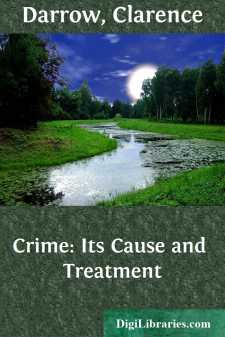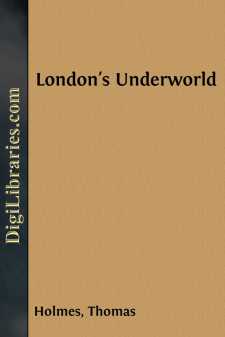True Crime
- General 29
True Crime Books
Sort by:
by:
Clarence Darrow
I There can be no sane discussion of "crime" and "criminals" without an investigation of the meaning of the words. A large majority of men, even among the educated, speak of a "criminal" as if the word had a clearly defined meaning and as if men were divided by a plain and distinct line into the criminal and the virtuous. As a matter of fact, there is no such division, and...
more...
TWELVE CAUSES OF DISHONESTY Only extraordinary circumstances can give the appearance of dishonesty to an honest man. Usually, not to seem honest, is not to be so. The quality must not be doubtful like twilight, lingering between night and day and taking hues from both; it must be day-light, clear, and effulgent. This is the doctrine of the Bible: Providing for honest things, not only in the sight of...
more...
CHAPTER I. THE STATISTICS OF CRIME. It is only within the present century, and in some countries it is only within the present generation, that the possibility has arisen of conducting the study of criminal problems on anything approaching an exact and scientific basis. Before the introduction of a system of criminal statistics—a step taken by most peoples within the memory of men still living—it...
more...
CHAPTER I. The Pleasant Fiction of the Presumption of Innocence There was a great to-do some years ago in the city of New York over an ill-omened young person, Duffy by name, who, falling into the bad graces of the police, was most incontinently dragged to headquarters and "mugged" without so much as "By your leave, sir," on the part of the authorities. Having been photographed and...
more...
I The Woman in the Case On a sultry August afternoon in 1903, a dapper, if somewhat anaemic, young man entered the Broadway store of Rogers, Peet & Company, in New York City, and asked to be allowed to look at a suit of clothes. Having selected one to his fancy and arranged for some alterations, he produced from his wallet a check for $280, drawn to the order of George B. Lang, and signed E....
more...
by:
John Thomson
y Son get Money, said a wiser Man than you or I, honest Reader: That is the Precept; but he went no farther, leaving the Business of Committee Men, Ways and Means, &c. to the peculiar Turn of Thought, or Biass of Invention of every individual Money-Getter. Of all the Methods made use of to attain this great End, I believe it will be allow'd that he who gains his point the easiest way, is the...
more...
For nearly one hundred years this curious problem has exercised the imagination of writers of fiction—and of drama, and the patience of the learned in history. No subject is more obscure and elusive, and none more attractive to the general mind. It is a legend to the meaning of which none can find the key and yet in which everyone believes. Involuntarily we feel pity at the thought of that long...
more...
by:
Charles Whibley
INTRODUCTION There are other manifestations of greatness than to relieve suffering or to wreck an empire. Julius Cæsar and John Howard are not the only heroes who have smiled upon the world. In the supreme adaptation of means to an end there is a constant nobility, for neither ambition nor virtue is the essential of a perfect action. How shall you contemplate with indifference the career of an artist...
more...
INTRODUCTION The contents of these volumes of 'Celebrated Crimes', as well as the motives which led to their inception, are unique. They are a series of stories based upon historical records, from the pen of Alexandre Dumas, pere, when he was not "the elder," nor yet the author of D'Artagnan or Monte Cristo, but was a rising young dramatist and a lion in the literary set and...
more...
by:
Thomas Holmes
CHAPTER I. MY FRIENDS AND ACQUAINTANCES The odds and ends of humanity, so plentiful in London's great city, have for many years largely constituted my circle of friends and acquaintances. They are strange people, for each of them is, or was, possessed of some dominating vice, passion, whim or weakness which made him incapable of fulfilling the ordinary duties of respectable citizenship. They had...
more...











